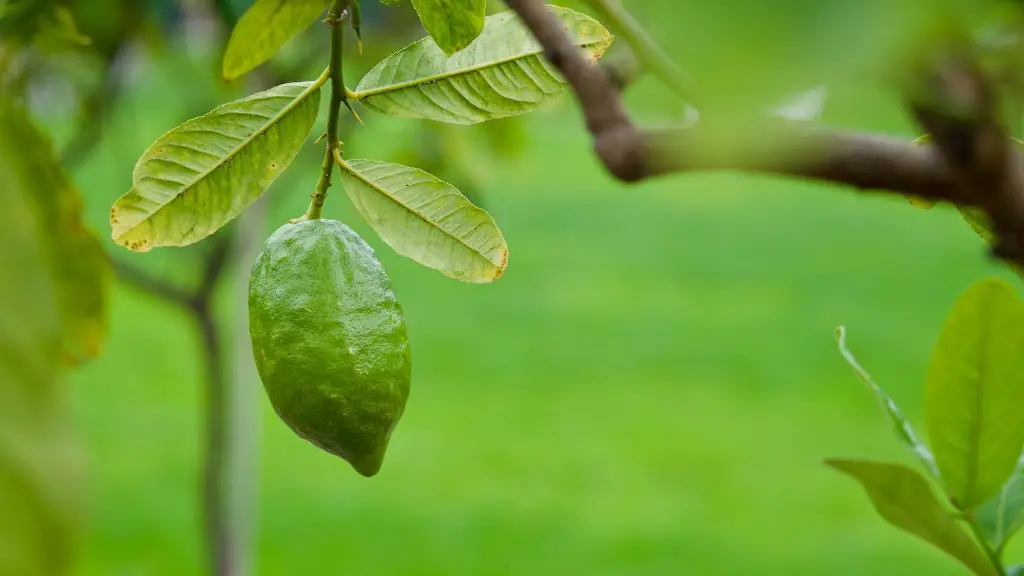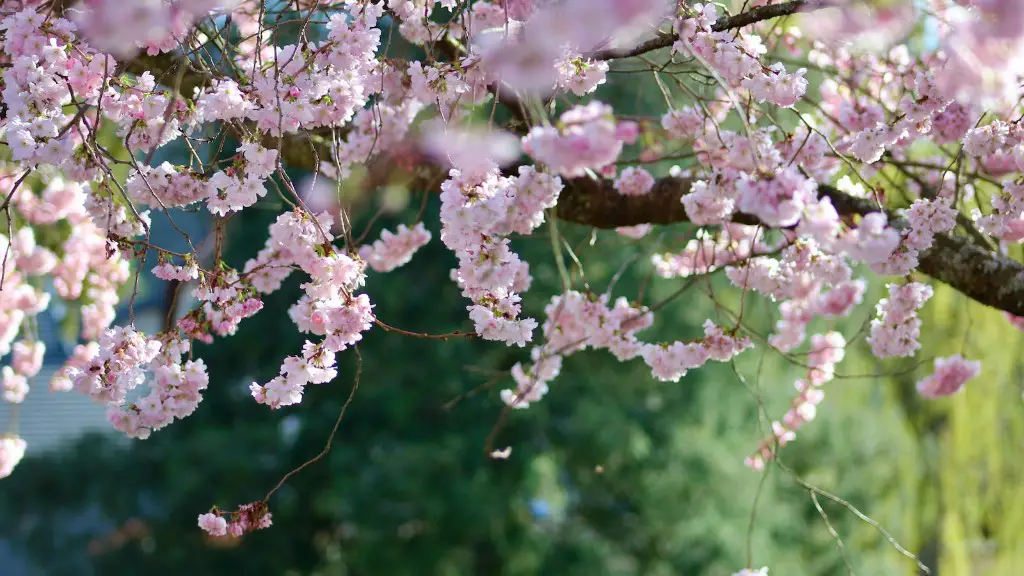Can one grow a lemon tree in an apartment? The answer is yes. Growing a lemon tree in an apartment is not only possible but it also provides many benefits. Lemons provide lots of health benefits, ranging from improving gut health to helping with weight management. Additionally, they offer a burst of flavor to numerous recipes and drinks, adding zest to the palette. Growing a lemon tree in an apartment can be a great way to conserve and save on the costs associated with buying groceries for citrus fruits. Furthermore, there is the satisfaction of being able to use lemons from one’s own lemon tree.
Since many apartments can be quite small, space is limited and as such, it is important to find a lemon tree that is suitable for the indoor environment. Some ideal varieties are the Meyer, Femminello, and Santa Teresa lemon trees. These trees can survive in a potting mix of peat, sand and soil, or even a hydroponic environment. Furthermore, plant lights can be used to help simulate natural sunlight and boost the growth of the tree. With adequate sunlight, fertilizer, and potting, these trees can thrive in apartments.
Yet, it is also important to recognize that certain precautions are necessary when growing a lemon tree in an apartment. Although lemon trees are easy to care for when given adequate conditions, they require daily care, including watering, pruning, and fertilizing. It is additionally prudent to protect the tree from light exposure and intense temperatures, as these may damage the plant. To ensure a healthy tree and great quality fruits, regular maintenance and observation are necessary.
Finally, although there is the satisfaction of being able to enjoy the fruits of one’s labors, the most important part of growing any plant is to enjoy the process. With some dedication and passion for the tree, gardening can be a great daily stress reliever and avenue for advancing one’s green thumb. So, if one is looking for a fun project that is rewarding and provides a great deal of health benefits, growing a lemon tree in an apartment is a great option.
What are the Benefits of Growing a Lemon Tree in an Apartment?
There are many benefits to growing a lemon tree in an apartment. Lemons are a great source of nutrition, best known for their hefty amounts of Vitamin C. Vitamin C helps increase the body’s immunity, fight off infections and reduce inflammation. Furthermore, lemons also contain Potassium, Magnesium, Folate, and many other beneficial nutrients, helping to maintain a healthy body. Growing a lemon tree in an apartment not only allows access to these nutrients but also cuts down grocery costs when it comes to buying citrus fruits.
In addition to the health benefits, lemons add a burst of flavor to many recipes and drinks. From flavoring salads and marinades to acting as a garnish on drinks and desserts, lemons are a versatile ingredient that is easy to find. By growing a lemon tree in an apartment, one can access these flavors in an organic and convenient manner. Additionally, lemons act as natural air fresheners, adding a fresh scent to the house. The scent of the lemons is rooted in their potency of limonene, which gives the lemons their fragrant aroma and acts as a natural refresher.
For those that are looking for a hobby with significant rewards, growing a lemon tree in an apartment can be a great activity. Taking care of a plant can reduce stress, bring a sense of purpose, learning about the tree, as well as honing skills for plant care. From pruning the branches to watching the tree slowly grow, the satisfaction of seeing the fruits of one’s labor is invaluable. Whether looking just for the health or the emotional benefits, growing a lemon tree in an apartment can provide them both.
How Should Lemon Trees Be Cared For in an Apartment?
Lemon trees, similar to any other plant, need proper care to thrive and bear fruit in an apartment setting. Lemon trees require adequate sunlight and water in order to grow and develop. Plant lights can be used to simulate natural sunlight, while the amount and consistency of water can be monitored depending on the soil type, the size of the pot, and the temperature of the room. Pruning of the branches can help to shape the trees and aid in fruit production, by promoting airflow and eliminating any dead or damaged branches.
Furthermore, lemon trees also respond positively to fertilizers. Organic fertilizers, such as eggshells and fish emulsions, are a great choice for fertilizing lemon trees. As different soils require different amounts of fertilizers, monitoring enzymes helps gauge how much nutrients and compounds the soil needs to ensure the healthy growth of the lemon tree. Additionally, pests can be an issue when growing a lemon tree in an apartment. Refos, scale, and aphids are some of the insects that can damage the tree. Spraying the lemon tree with organic and insecticidal soaps helps to mitigate against any pest or insect invasion.
Lastly, protection of the lemon tree is essential when growing one in an apartment. Intense heat and light can damage the trees, as can potential drafts from A/C units and windows. Thus, finding the most suitable spot in the apartment, away from direct sunlight and intense temperatures, is important. Wrapping the pot in plastics can also help protect the tree from any other external conditions such as cold weather and animal activity.
What Are The Benefits of Pruning a Lemon Tree in an Apartment?
Pruning a lemon tree in an apartment is an important process as it helps maintain a healthy tree, improve fruiting, and shape the tree for enhanced appearance. By pruning away any dead or damaged branches and promoting air flow, the tree is more likely to bear more and better quality fruits. Furthermore, pruning away unhealthy shoots and limbs helps to improve the structure of the tree and adds to its longevity.
Since a lemon tree in an apartment is usually grown in a pot, during the course of its growth, the tree can begin to resemble a bush due to root containment by the pot. To prevent this and to encourage the tree to grow in its upright form, pruning becomes important. In addition, pruning can also help to control the size of the tree, as some lemon trees can become large and unmanageable. Pruning helps to maintain the growth of the tree, promoting branching and allowing fruit to grow in an uncluttered fashion..
What Varieties of Lemon Trees Are Suitable for Growing in an Apartment?
When it comes to suitable lemon trees for growing in an apartment, there are a few types that thrive in the indoor environment. The Meyer lemon tree is the most common lemon tree for growing in an apartment, as it requires minimal care and is one of the hardiest citrus fruits. Additionally, Femminello and Santa Teresa lemon trees are also good options for the indoor environment. These dwarfed varieties are perfect for apartments as they can reach a maximum height of about six feet.
The type of pot chosen for the tree is also important. Since apartments usually lack outdoor space, it is important to select a pot size in accordance with the size of the tree. Generally, a pot size of eight inches is ideal for a lemon tree of up to three feet, while a pot size of twelve inches is suitable for a three-foot to five-foot lemon tree. It is also important to pick a type of potting that is suitable for lemon trees. A potting mix of peat, sand and soil, or even a hydroponic environment is ideal for lemon trees growing in an apartment.
What Are The Sunlight Requirements for Growing a Lemon Tree in an Apartment?
When growing a lemon tree in an apartment, it is imperative to pay attention to the sunlight requirements of the tree. Lemon trees require at least five hours of sunlight a day to grow properly and can tolerate up to eight hours of direct sunlight. Since many apartments lack direct access to natural sunlight, it is necessary to find an alternate way to mimic natural lighting. Using grow lights helps the tree to receive the approximate amount of light needed in a day. Grow lights also help to regulate the temperature of the lemon tree, ensuring it stays at the optimal range for growth.
Since apartments receive natural sunlight intermittently, it is important to monitor the amount of direct sunlight the lemon tree is receiving. If the tree is placed too close to windows or balconies, the intensity and duration of sunlight can be more than the tree can handle, and the lemon tree will suffer the consequences. To protect the tree from direct sunrays, it is better to move the tree away from windows and balconies.
Can Lemons Grow Without Fertilizer?
Fertilizers are important for helping any type of tree grow, as they contain essential nutrients that are required for the tree to thrive. When it comes to lemon trees, it is necessary to feed the trees with a fertilizer that is intended for citrus trees. Generally, a citrus fertilizer, applied every six to eight weeks, is ideal for growing a lemon tree in an apartment. Now, it is possible to grow a lemon tree in an apartment without any fertilizer. However, the growth of the tree will be slow and the quality of the fruits produced will be low. Furthermore, the tree will be susceptible to diseases, infections, and pests due to a lack of essential nutrients.
What Are The Pruning Requirements for a Lemon Tree in an Apartment?
Pruning a lemon tree in an apartment, much like any tree, is essential for its healthy growth and production of quality fruits. Lemon trees should be pruned twice a year, once in the early spring and then again in the late summer. During this process, any dead or damaged branches should be cut away to promote air flow, eliminate any disruptions to fruit production, and maintain the desired height and shape of the tree. Additionally, pruning also helps to remove any overcrowded shoots and branches to prevent the tree from becoming too large or chaotic.
At the same time, it is important to take care not to prune too much, as this can interfere with the production of the lemon flowers. Pruning the tops of the branches overly much can cause the tree to bloom smaller flowers, leading to fewer lemons. Pruning lemon trees in an apartment provides numerous benefits and should be conducted with care and respect to the tree.




